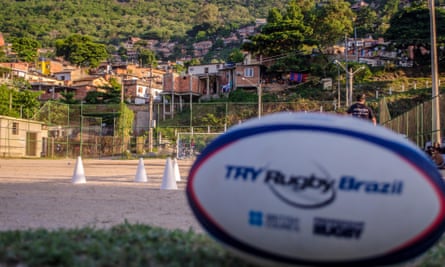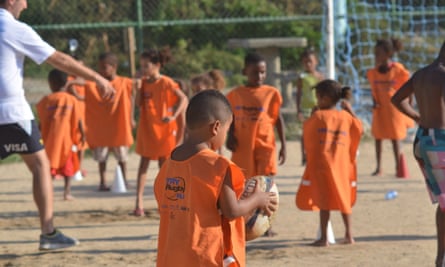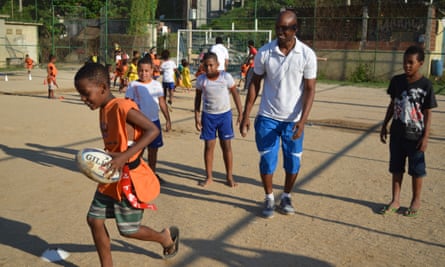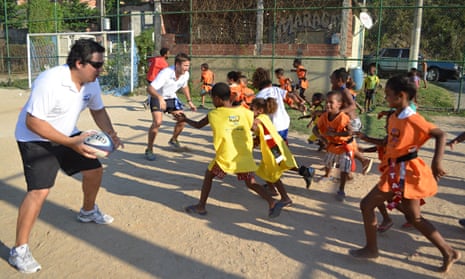In 2016 Rio de Janeiro will host the summer Olympic Games. Around the city preparations continue. However, work is not confined to the stadiums, the athletes’ village or the bustling HQ near the Sambódromo, the venue for the annual carnival. In the favelas, the dangerous shanty towns that climb the hills of the city, coaches are working to bring Brazil up to speed with a new Olympic sport.
Last week, coaches from Premiership Rugby introduced their game to the children of Cachoeirinha, a favela not too far from the Maracanã. The contrast with the great football stadium or even Kingsholm on a Friday night was of course stark.
The Premiership is aiming to carve out a space for rugby in a country crazy for football. It is an effort somewhat similar to Britain forming a handball team for 2012. Unlike handball in Britain, rugby has been played in Brazil for many years: in 1936 the Lions played there and won 82-0, Prince Alexander Obolensky scoring 17 tries. Possibly unsurprisingly, progress since has been slow.
In 15-a-side rugby Brazil are dwarfed by Argentina and are some way behind even Uruguay but in sevens they will soon host the best. Therefore, the British Council-backed initiative, Try Rugby, and SESI, the country’s “industrial social service”, are backing the formation of men’s and women’s teams to compete with New Zealand, Fiji and other giants of the shortened game. In São Paulo last week, Felipe Claro, a 29-year-old wing, and Isadora Saludo, a 24-year-old fly-half, discussed their Olympic aspirations.

“We’re working hard to give our best,” said Claro, who spent four years at a crucible of the English game – Heaton Moor RUFC, near Stockport. “We’re very excited. No one knows what’s going to happen. Every day is training, training. We just count the days until the Games.”
“I don’t have a job, I’m full-time,” said Saludo, who picked up the game in the US, where she was born. “But it is pretty short-term: 2016 is the focus. There’s a lot hinging on the success, in terms of public visibility. If we can get some results to convince people that Brazil can compete, then maybe the funding will be there.”
With the 2016 Games in mind, Try Rugby Brazil launched in September 2012. Preaching the physical and philosophical benefits of rugby, it has worked in schools and communities in São Paulo and elsewhere. More than 54,000 young people and adults have been taught and mentored, on and off the field.
If rugby stays in the Games beyond 2020, such efforts may pay off on a global scale. For now, they are certainly paying off locally, at the very bottom of Brazil’s social scale.
Cachoeirinha’s name means “little waterfall” but it does not refer to the litter-strewn streams that snake past its haphazard houses and rough, potholed streets. Cachoeirinha’s waterfall is a squat and cracked concrete column, from which two pipes spout clean water. It sits next to another priceless resource – a small, fenced-in patch of dirt, Cachoeirinha’s sports field, where children aged from three to 15 or so ran, passed, dummied and dodged. The din was happy and deafening.
Life in the favelas is not always so carefree. The children played under the eyes of a police pacification unit, members of the force responsible for “pacifying” the drug and gang-riddled favelas. Their mission is controversial – and violent. As comandante Marcos spoke to the children – following SESI representatives and Wayne Morris, once captain of Pontypool, now Premiership Rugby’s community director – his heavily armed men looked on.
Try Rugby Rio has a rather less militaristic overseer: Dom Caton, a bearded 28-year-old formerly employed by Exeter Chiefs. He admitted to having harboured “a slight apprehension” about the favelas, where food is scarce and children attend school for half a day if they’re lucky. He is now, however, settled in.

“The world’s perception of the favelas is generally very negative,” he said, “but programmes like this are very positive. Although we do have the police here, it’s very friendly. Parents will come down, it’s relaxed.”
As shrieking kids played tag, others watched from the hillside. Many came down to join in. Those who attend Try Rugby sessions are not only taught to pass and sidestep. They are also given a meal.
The children ran and ran. “They’ve got that innate athletic ability,” Caton said. “Their footwork is amazing to see.”
One boy, maybe nine years old, barefoot and wearing a T-shirt emblazoned with portraits of Neymar and Kaká, played keepy-uppy with a rugby ball before volleying it, smack, into the top corner of a ragged net goal. “Of course, they get that ability and footwork from football,” Caton said
That much had been clear the night before, in a rather more monied part of the city. On Ipanema beach, players from the Rio Rugby club, including the astonishingly athletic Marcos Paixão, an international centre known as Careca who is from the Contagolo favela, ran dazzling patterns on the sand. Careca did not make the men’s squad who competed at the recent Hong Kong Sevens. Perhaps that was an indication of his country’s growing strength.
In the favelas and schools the search for such talent continues. A day before kick-off in Cachoeirinha, in a working class area of São Paulo, 13 and 14-year-old boys and girls played tag in a SESI sports hall. Asked if they had heard of rugby before the arrival of their Premiership coaches, a gaggle of beaming girls said no. Asked if they had thought they were being offered American football, they said yes. Asked if they had learned Try Rugby’s cherished values of discipline, respect and hard work, and if they planned to continue playing, they cheered their agreement.

The Try Rugby coach Juliet Short, an England Under-20 flanker, raised her voice to be heard. Asked if she felt like a missionary, she offered a self-deprecating “no”. Happily, she then contradicted herself.
“I feel really blessed I can share my passion for the sport,” she said, “share what it means for me. Rugby has saved me, helped me with respect and solidarity, I really believe in the values. For me to share my love is a once-in-a-lifetime opportunity.”
As the Olympics approach, the Brazilian game has a once-in-a-lifetime opportunity of its own. In the favelas and schools, Premiership Rugby is helping to seize it.
Martin Pengelly travelled courtesy of the British Council
